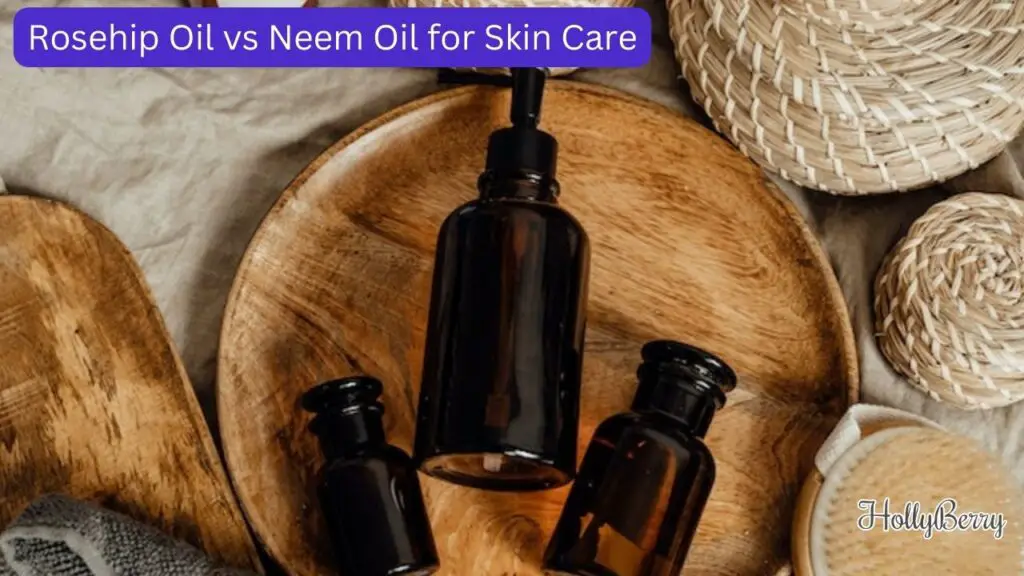
When it comes to skincare, natural oils have been gaining popularity for their many benefits. Two oils that have been making rounds in the beauty world are rosehip oil and neem oil.
While both are known for their skin-nourishing properties, they differ in their uses and benefits. In this article, we’ll delve into the differences between rosehip oil and neem oil and help you determine which one is right for your skin.
Overview of Rosehip Oil
Rosehip oil is derived from the fruit of the rose plant and has been used for centuries for its healing properties.
It is a rich source of antioxidants, essential fatty acids, and vitamins A, C, and E. These properties make rosehip oil a popular ingredient in many skincare products.
Benefits of Rosehip Oil
- Hydrates and moisturizes the skin
- Reduces the appearance of fine lines and wrinkles
- Improves skin elasticity
- Reduces the appearance of scars and dark spots
- Soothes irritated skin
- Protects against sun damage
How to Use Rosehip Oil
Rosehip oil can be used alone or mixed with other skincare products. It is best to apply it on damp skin to lock in moisture.
Massage a few drops of the oil into your face and neck in a circular motion until fully absorbed. It can also be used on the body to improve skin texture and appearance.
Overview of Neem Oil
Neem oil is extracted from the seeds of the neem tree, which is native to India. It has been used in traditional medicine for its anti-inflammatory, antifungal, and antibacterial properties.
Neem oil is also rich in essential fatty acids, vitamins, and minerals.
Benefits of Neem Oil
- Treats acne and blemishes
- Soothes eczema and psoriasis
- Relieves dry and itchy skin
- Reduces the appearance of scars
- Repels insects
- Promotes hair growth
How to Use Neem Oil
Neem oil can be used alone or mixed with other carrier oils such as coconut oil or almond oil. It is best to do a patch test before using it on your face as it may cause irritation in some people.
Apply a few drops of the oil to your face or body and massage it in until fully absorbed. It can also be used on the scalp to promote hair growth and prevent dandruff.
Rosehip Oil vs Neem Oil: Which One Should You Choose?
While both rosehip oil and neem oil have their unique benefits, they cater to different skin concerns. Here’s a breakdown of which oil is suitable for what skin type:
Dry skin: Rosehip oil
Oily skin: Neem oil
Acne-prone skin: Neem oil
Ageing skin: Rosehip oil
Irritated skin: Rosehip oil
If you have a combination of skin concerns, you can mix the two oils to get the benefits of both.
My conclusion
In conclusion, rosehip oil and neem oil are both excellent natural oils with many benefits for the skin. The choice between the two depends on your skin type and concerns.
Always do a patch test before using any new product on your skin and consult a dermatologist if you have any skin conditions.
FAQs Rosehip Oil vs Neem Oil for Skin Care

Is rosehip oil good for sensitive skin?
Yes, rosehip oil is gentle and non-irritating, making it suitable for sensitive skin.
Can rosehip oil be used on the body?
Yes, rosehip oil can be used on the body to improve skin texture and appearance.
Is neem oil good for hair?
Yes, neem oil promotes hair growth and prevents dandruff.
Can rosehip oil be used for oily skin?
Yes, rosehip oil can be used for oily skin, but it is best to use it in small amounts or mix it with carrier oil.
I hope this article has helped you understand the differences between rosehip oil and neem oil and which one is best suited for your skin.
Remember to always do a patch test and consult a dermatologist if you have any skin conditions.


